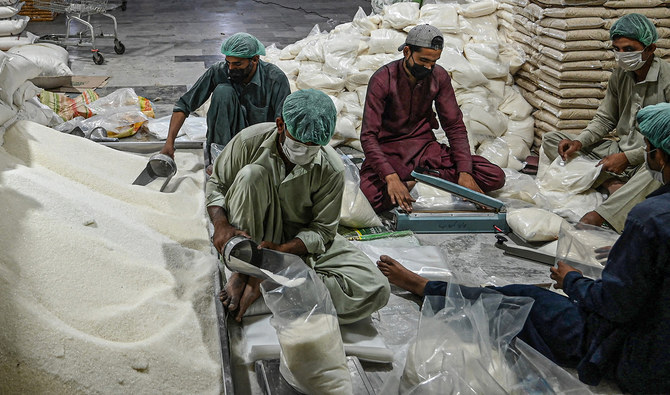ISLAMABAD: Pakistan may face yet another sugar crisis in the near future as an industry representative on Friday said the sugar industry was reluctant to start cane crushing until the government allows surplus quantity to be exported.
Sugar remains one of the largest consumed food commodities in Pakistan. It is used in large amounts in food processing, beverages, and bakery items. Owing to its huge demand, the government sets its procurement prices while the sugar industry is protected by a 40 percent import tariff to ensure prices remain stable.
“We have a surplus sugar of 1.2 million tons and have been urging the government to allow us to export the commodity,” Syed Umar Hayat Shah, a sugar industry representative in Islamabad, told Arab News. He said the sugar industry can earn $1 billion in foreign exchange if the government gives the green signal for the export.
Shah said the industry had produced eight million tonnes of sugar last season, adding that 1.2 million tonnes were produced in surplus. “We cannot start the crushing season until the government allows us to export the surplus commodity,” he explained.
He said Pakistan could face a sugar shortage soon if the government failed to take a timely decision on exporting sugar. Shah said the government had all the required data on sugar production through the track and trace system.
“Farmers and consumers will suffer if the cane crushing season cannot start in time,” Shah said.
Federal governments in Pakistan have provided subsidies on the export of surplus sugar in the past, which turned out to be a scam of billions of rupees. Experts increasingly blame influential businessmen and politicians of colluding to hike sugar prices in local markets and then offering subsidies for its export.
Rising food prices, particularly of sugar and wheat flour, present one of the toughest challenges for the government. This is the main reason that the government is resisting the sugar industry’s demand to export the item.
Tariq Bashir Cheema, minister for national food security, on Thursday categorically declared during a National Assembly session that he would not allow surplus sugar to be exported without proper verification of its stock.
The Punjab government on Friday said it would issue a notification regarding the sugarcane procurement price in the province in a couple of days to force the industry to start crushing season.
“We stand by our farmers and will be doing everything possible to protect their interests,” Mussarat Jamshed Cheema, a spokesperson of the Punjab government, told Arab News.
She said that Pakistan Tehreek-e-Insaf (PTI) Chairman Imran Khan has already directed the provincial government to look into the issue on priority and that a notification for the sugarcane support price would be issued soon.
“Agriculture is the backbone of our economy and the Punjab government has been working on different schemes to support farmers,” Cheema said. “The sugar industry will be forced to start the crushing season as early as possible and pay a good price to farmers on sugarcane procurement.”
Farmers said they would be protesting against the government if it failed to set a sugarcane procurement price and force the industry to start crushing season in the next couple of days.
“The industry should have started the sugarcane crushing in the first week of November, but they are busy blackmailing the government and the farmers,” Khalid Bath, president of the Kissan Ittehad farmers association, told Arab News.
He said farmers would not be able to cultivate sugarcane next year if the crop was not harvested timely. “The crop is ripe now and we cannot afford to take care of it further,” he added.












